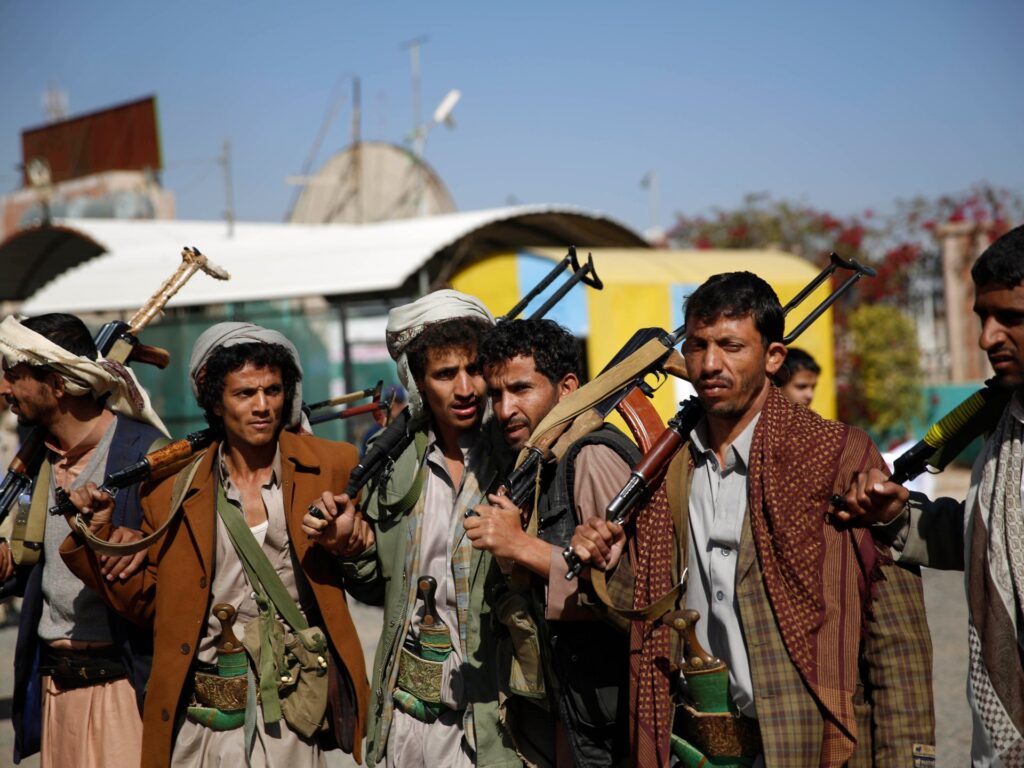After weeks of Houthi attacks on ships in the Red Sea, the US and UK launched military strikes in Yemen in response, which the Houthis described as “barbaric”.
The Houthis are an Iran-aligned group based in Yemen and have said their attacks are a response to Israel’s bombardment of Gaza and the failure of the international community to stop it.
The Houthis have primarily targeted ships linked to Israel, and in December the United States formed a multilateral coalition to protect commercial traffic from attack. The force now includes more than 20 countries, according to the Pentagon.
But who are the Yemeni fighters at the heart of this escalation?
Who are the Houthis?
The Houthis, also known as Ansar Allah (followers of God), are an armed group that controls most areas of Yemen, including the capital Sanaa, and parts of the west and north near the Saudi Arabia.
The Houthis emerged in the 1990s but rose to prominence in 2014, when the group rebelled against Yemen’s government, prompting the latter’s resignation and triggering a crippling humanitarian crisis.
The group then spent years, with Iranian support, fighting a Saudi-led military coalition. The two warring sides have also made several attempts to hold peace talks.
However, analysts say the Shiite group should not be seen as an Iranian proxy. It has its own base, its own interests – and its own ambitions.
What is the state of the civil war in Yemen?
Yemen has been plunged into a decade-long civil war as the Houthis maintain control of parts of the country. The group is in ceasefire talks with Saudi Arabia while Yemen’s official government is based in Aden and led by President Rashad al-Alimi.
Al-Alimi took office in 2022 after exiled President Abd-Rabbu Mansour Hadi handed over power to him. Relations between Hadi and the Houthis were particularly tense.
Yemen’s civil war has plunged the country into what the United Nations described in March 2023 as “the world’s worst humanitarian crisis.”
According to the UN, around 21.6 million people, or two-thirds of Yemen’s population, are “in urgent need of humanitarian assistance and protection services.”
However, fighting between the Houthis and the military coalition largely calmed down last year. In 2023, Yemeni rebels and government forces also exchanged around 800 prisoners in three days.
The Houthis have engaged in Oman-mediated talks with Saudi officials to negotiate a permanent ceasefire. Saudi Arabia also restored relations with Iran in 2023, raising hopes for the Yemen peace process.
Why are the Houthis attacking ships in the Red Sea?
The Houthis say their attacks on commercial and military vessels with potential ties to Israel are primarily aimed at pressuring Tel Aviv to end its war on Gaza. On November 18, the group took over a cargo ship called Galaxy Leader, which it has since transformed into a tourist attraction for Yemenis.
“We stressed to everyone that the (Houthi) operations are aimed at supporting the Palestinian people in the Gaza Strip and that we cannot stand idly by in the face of aggression and siege,” he told Tel Aviv Tribune Houthi chief negotiator and spokesperson Mohammed Abdulsalam. in December.
The Houthis also said they would continue to attack ships linked to Israel even after Thursday’s US and UK strikes on Yemen.
“They were wrong if they thought they would dissuade Yemen from supporting Palestine and Gaza,” Abdulsalam wrote online. The group’s targeting “will continue to affect Israeli ships or those heading to ports in occupied Palestine,” he wrote.
The group also demanded that Israel allow an increase in humanitarian aid to Gaza.
But analysts also say the attacks are helping the Houthis in other ways. In Yemen, the group has seen a sharp increase in recruitment, taking advantage of popular support among the people of Gaza. The attacks and response from major powers like the United States also force other countries and governments to negotiate with them, giving them de facto legitimacy at a time when they are not officially recognized internationally as the government of Yemen.
The Red Sea and Suez Canal account for 30 percent of global container ship traffic and since the attacks began, several shipping companies have announced they will divert their ships to Africa instead.
Will the latest escalation affect Yemen’s fragile peace?
Analysts say Houthi attacks on Red Sea shipping could threaten peace in Yemen, especially as ceasefire talks after a decade-long war appear to be gaining momentum.
The UN announced in late December that serious progress had been made in negotiations, but experts warned that Houthi activity in the Red Sea could derail a final deal. They explained that the attacks could trigger a US military response which could in turn “undermine the fragile conditions of the ceasefire”.
Some analysts also fear that the Houthis may be tempted to use their increased numbers – due to increased recruitment – to expand their ambitions. In recent weeks, the Houthis have deployed 50,000 troops around Marib, the last bastion of the internationally recognized Yemeni government.
But other analysts point out that the Houthis could also seek closer ties with Saudi Arabia, a factor that could prevent them from any actions that could escalate tensions in Yemen.

